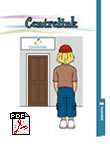- TOOL KITS
- A. The NEXT Step
- B. Promoting Independence
- C. Phone Apps
- D. Return to Work
- E. Motivational Interviewing
- F. Paediatric Brain Injury Rehabilitation Resources
- a) Introduction
- 0. Introduction
- 1. Transition
- 2. The transition wheel
- 3. Walking around the transition wheel
- 4. The transition wheel interview
- 5 . Using this kit
- 6 . Web resources
- b) Working together
- 7. My role
- 8 . My family's role
- 9. My case manager's role
- c) What can I do?
- 10. Who, where, what? The Services I receive
- 11. Accommodation
- 12. Driving
- 13.Alcohol and drugs
- 14. Social and recreational activities
- 15. Health and well-being
- 16. Relationships and friendships
- 17. Sexuality
- 18. Personal safety
- 19. Complaints/rights
- 20. Legal issues
- 21. Centrelink
- 22. Financial
- 23. Shopping
- 24. Employment, training and tertiary education
21. Centrelink
Centrelink is a Federal Government organisation that provides many services including employment services and financial assistance.
As you become more independent you may become eligible for financial assistance from Centrelink. Your parents may already receive some help from Centrelink.
There are many different types of assistance including disability payments, mobility allowances, youth allowances and help with paying rent. There are strict criteria that you need to meet to be eligible for payments.
You may be surprised by what you are eligible to receive!
It is advisable to speak with someone from Centrelink directly because the different payments and criteria can be confusing and make it hard to know what you are eligible for. There are a couple of ways to get in touch with Centrelink:
• Contact the Centrelink call centre – they will be able to talk with you over the telephone and advise you of what services you may be eligible for. They can also send you out an information package and application forms for the different payments. Once you receive the forms fill them out as best as you can and post them back to Centrelink or drop them into your local Centrelink office. Centrelink will then contact you to discuss what assistance they are able to provide for you.
• Make an appointment to see the Disability Officer at your local Centrelink if you want to speak with someone personally about your entitlements or are having trouble filling out the Centrelink forms. You can make an appointment to see the Disability Officer at your local Centrelink office by contacting the Centrelink Appointment Line. It may be a good idea to talk with the Disability Officer if you are having trouble working out what you want, or what Centrelink can help you with.
• Call into your local Centrelink office to pick up the application forms – You should know what you are entitled to before you go in to pick up forms.
If you have received or may receive a lump sum payment from your insurance company remember to discuss this with Centrelink. It may affect your eligibility or the amount of money that you receive for some payments.
When you apply for financial assistance through Centrelink you may also be eligible for other services provided by Centrelink. These include being eligible for assistance through the Disability Employment Service. These services provide information as well as training and support to find and keep a job. If you think these services might be able to help you or you, want some more information about what they can off er, make sure you talk with someone at Centrelink about these services.
Centrelink contact numbers
Disability, illness and injury line 13 27 17 (For information on the disability support pension, career payment, mobility allowance, sickness allowance and carers allowance)
Appointment line 13 10 21 (Ring this number to make an appointment with someone at your local Centrelink Office)
Students line 13 24 90 (For people who are studying)
More Centrelink contact numbers are in your local White Pages.


